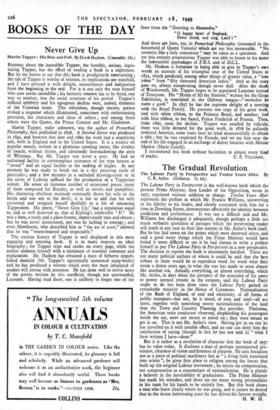BOOKS OF THE DAY
Never Give Up
Martin Tupper: His Rise and Fall. By Derek Hudson. (Constable. 18s.)
READING about the incredible Tupper, the horrible, serious, ingra- tiating Tupper, has the effect of reading a book in a nightmare. But let me hasten to say that this book is prodigiously entertaining ; the tale of Tupper is worthy of relation, its implications are manifold, and I have perused it with delight, astonishment and indignation from the beginning to the end. For it is not only the man himself who now seems incredible ; his fantastic renown has to be fitted, one way or another, into the social structure of his period. Tupper's inflated celebrity and his egregious decline were, indeed, elements of the Victorian scene. This ridiculous, though sincere, person evoked a response which illuminated, sometimes with embarrassing precision, the characters and ideas of others ; and among those others were the Queen, the Prince Consort and Mr. Gladstone.
Martin Tupper, today unknown, was the author of Proverbial Philosophy, first published in 1838. A Second Series was produced in 1841, and between that date and 186o the work had a stupefying sale, both in England and in the United States. It is a treatise on popular morals, written in a glutinous crawling metre, like rivulets of treacle, without rhyme, and admittedly foreshadowing the style of Whitman. But Mr. Tupper was never a poet. He had an unlimited facility in commonplace utterance of the type known as " moral " and an equal facility in the making of jingles. At any moment he was ready to break out in a dry pattering rattle of platitudes ; and a few minutes in a secluded drawing-room or in the caves of Lydstep sufficed for the production of a Tupperian sonnet. He wrote an immense number of occasional pieces, many of them composed for Royalty, as well as novels and pamphlets. His chattering ebullient rectitude eventually drove his wife to the bottle and one son to the devil ; it is fair to add that his wife recovered and resigned herself dutifully to a life of unceasing Tupperdom. His poem, " Never Give Up," had a reputation equal to, and as well deserved as, that of Kipling's intolerable " If." He was a bore, a toady and a place-hunter, imperviously vain and obtuse ; but he was never inconsistent, nor was he lacking in courage ; and even Hawthorne, who described him as " the ass of asses," allowed that he was " warm-hearted and respectable."
The curious history of Tupper is well displayed in this most engaging and amusing book. It is in many respects an ideal biography ; for Tupper trips and rattles on every page, while the author contents himself with a minimum of essential comment and explanation. Mr. Hudson has obtained a mass of hitherto unpub- lished material (Mr. Tupper's egotistically annotated scrap-books) and he has produced a volume which even the most infuriated of readers will peruse with attention. He has done well to revive some of the poems written by this unofficial, though not unrewarded, Laureate. Having read them, one is unlikely to forget two of the lines from the " Greeting to Alexandra."
" 0 happy heart of England, Shout aloud, and sing, Land "
And there are lines, too, in Proverbial Philosophy (treasured in the household of Queen Victoria) which are not less memorable. " No cosmetic like a holy conscience" may be taken as a specimen. And yet this entirely preposterous Tupper was able to fasten to his name the honourable appendages of F.R.S. and of D.C.L.
Mr. Hudson is fortunate in being able to give in Tupper's own words an account of his triumphal tour of the United States in 185i, which produced, among other things of greater value, a " love token" from "fifty thousand American ladies." And so the story goes on, always exasperating though never dull. After the death of Wordsworth, Mr. Tupper hopes to be appointed Laureate instead of Tennyson. His " Hymn of All the Nations," written for the Great Exhibition, is translated in the Ojibway tongue—"monedoo ke ween e gook." In 1857 he has the supreme delight of a meeting with the Royal Family. He presents one copy of his great work, tied with white ribbon, to the Princess Royal, and another, tied with blue ribbon, to her fiancé, Prince Frederick of Prussia. Then, from 186o, came the decline. Tupper was assailed by ridicuk, there was little demand for the great work, in 1876 he gallantly revisited America, some years later he tried unsuccessfully to obtain a title ; but he was respected by Fronde, and we see him near the end of his life engaged in an exchange of dulcet fatuities with Minnie Mackay (Marie Corelli).
I recommend this book without hesitation to almost every kind






































 Previous page
Previous page